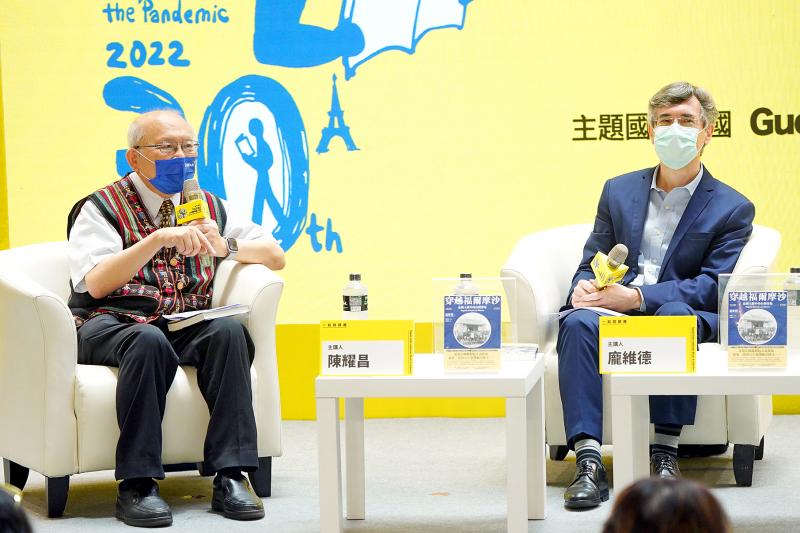Former European Economic and Trade Office in Taiwan (EETO) director Frederic Laplanche has praised Taiwan’s tradition of rebellion in his new book, saying he believes it to be an act of freedom and democracy.
There are plenty of French historic materials showing that Taiwanese disobeyed those in power as far back as 300 years ago, Laplanche said at the Taipei International Book Exhibition on Saturday.
In the book Taiwan racontee par les Francais (Taiwan told by the French), which is also available in Chinese, Laplanche said he attempted to find out what Taiwan was like from 1630 to 1930 through accounts from French soldiers, missionaries and officials stationed there.

Photo: CNA
During this period, Taiwan was ruled by the Spanish, the Dutch, Ming Dynasty loyalist Cheng Cheng-kung (鄭成功, also known as Koxinga) and later his son, the Qing Dynasty, and eventually the Republic of China.
Laplanche, who was head of the EETO from 2011 to 2015, praised Taiwanese for pursuing their rights under foreign rule and the democratic system they eventually built.
Not only Taiwanese, but also people from around the world should cherish the fruits of democracy in Taiwan, he said.
However, the tradition of rebellion has sometimes led to conflicts in Taiwan, Laplanche said, adding that he hoped those tragedies would not be repeated as Taiwanese push toward a freer and more democratic future.
In the book, he said he hoped to share with local readers exchanges between the Taiwanese and French, as well as information about the more well-known Sino-French War in the 1880s and Charles le Gendre, a French-born US officer and diplomat who negotiated with indigenous people in Taiwan in the 1860s.
“Many people, including myself, had little knowledge about what French people had done in Taiwan,” he said.
It is hoped that through the French materials Laplanche had studied, readers will see a very different and globalized Taiwan from a foreign perspective, the publisher said.
Laplanche was awarded a medal from the Taiwanese government in 2015 in recognition of his efforts to promote relations between Taiwan and the EU during his tenure.

A group of Taiwanese-American and Tibetan-American students at Harvard University on Saturday disrupted Chinese Ambassador to the US Xie Feng’s (謝鋒) speech at the school, accusing him of being responsible for numerous human rights violations. Four students — two Taiwanese Americans and two from Tibet — held up banners inside a conference hall where Xie was delivering a speech at the opening ceremony of the Harvard Kennedy School China Conference 2024. In a video clip provided by the Coalition of Students Resisting the CCP (Chinese Communist Party), Taiwanese-American Cosette Wu (吳亭樺) and Tibetan-American Tsering Yangchen are seen holding banners that together read:

UNAWARE: Many people sit for long hours every day and eat unhealthy foods, putting them at greater risk of developing one of the ‘three highs,’ an expert said More than 30 percent of adults aged 40 or older who underwent a government-funded health exam were unaware they had at least one of the “three highs” — high blood pressure, high blood lipids or high blood sugar, the Health Promotion Administration (HPA) said yesterday. Among adults aged 40 or older who said they did not have any of the “three highs” before taking the health exam, more than 30 percent were found to have at least one of them, Adult Preventive Health Examination Service data from 2022 showed. People with long-term medical conditions such as hypertension or diabetes usually do not

POLICE INVESTIGATING: A man said he quit his job as a nurse at Taipei Tzu Chi Hospital as he had been ‘disgusted’ by the behavior of his colleagues A man yesterday morning wrote online that he had witnessed nurses taking photographs and touching anesthetized patients inappropriately in Taipei Tzu Chi Hospital’s operating theaters. The man surnamed Huang (黃) wrote on the Professional Technology Temple bulletin board that during his six-month stint as a nurse at the hospital, he had seen nurses taking pictures of patients, including of their private parts, after they were anesthetized. Some nurses had also touched patients inappropriately and children were among those photographed, he said. Huang said this “disgusted” him “so much” that “he felt the need to reveal these unethical acts in the operating theater

Heat advisories were in effect for nine administrative regions yesterday afternoon as warm southwesterly winds pushed temperatures above 38°C in parts of southern Taiwan, the Central Weather Administration (CWA) said. As of 3:30pm yesterday, Tainan’s Yujing District (玉井) had recorded the day’s highest temperature of 39.7°C, though the measurement will not be included in Taiwan’s official heat records since Yujing is an automatic rather than manually operated weather station, the CWA said. Highs recorded in other areas were 38.7°C in Kaohsiung’s Neimen District (內門), 38.2°C in Chiayi City and 38.1°C in Pingtung’s Sandimen Township (三地門), CWA data showed. The spell of scorching